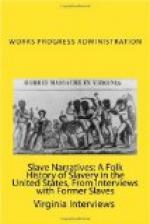“The most treacherous impulse of the human nature and the one to be most dreaded is jealousy.” With these words the aged Negro doctor launched into the expression of his political views. “I’m a Democrat.” He then explained how he voted for the man but had confidence that his chosen party possesses ability in choosing proper candidates. He is an ardent follower of Franklin D. Roosevelt and speaks of Woodrow Wilson with bated breath.
Through the influence of John W. Boehne, Sr., and the friendly advice of other influential citizens of Evansville Dr. Buckner was appointed minister to Liberia, on Woodrow Wilson’s cabinet, in the year 1913. Dr. Buckner appreciated the confidence of his friends in appointing him and cherishes the experineces gained while abroad. He noted the expressions of gratitude toward cabinet members by the citizens of that African coast. One Albino youth brought an offering of luscious mangoes and desired to see the minister from the United States of America. Some natives presented palm oils. “The natives have been made to understand that the United States has given aid to Liberia in a financial way and the customs-service of the republic is temporarily administered headed by an American.” “A thoroughly civilized Negro state does not exist in Liberia nor do I believe in any part of West Africa. Superstition is the interpretation of their religion, their political views are a hodgepodge of unconnected ideas. Strength over rules knowledge and jealousy crowds out almost all hope of sympathetic achievement and adjustment.” Dr. Buckner recounted incidents where jealousy was apparent in the behavior of men and women of higher civilizations than the African natives. While voyaging to Spain on board a Spanish vessel, he witnessed a very refined, polite Jewish woman being reduced to tears by the taunts of a Spanish officer, on account of her nationality. “Jealousy,” he said, “protrudes itself into politics, religion and prevents educational achievement.”
During a political campaign I was compelled to pay a robust Negro man to follow me about my professional visits and my social evenings with my friends and family, to prevent meeting physical violence to myself or family when political factions were virtually at war within the area of Evansville. The influence of political captains had brought about the dreadful condition and ignorant Negroes responded to their political graft, without realizing who had befriended them in need.”
“The negro youths are especially subject to propoganda of the four-flusher for their home influence is, to say the least, negative. Their opportunities limited, their education neglected and they are easily aroused by the meddling influence of the vote-getter and the traitor. I would to God that their eyes might be opened to the light.”
Dr. Buckner’s influence is mostly exhibited in the sick room, where his presence is introduced in the effort to relieve pain.




